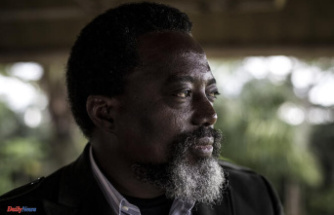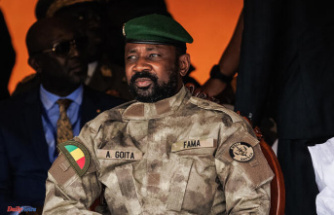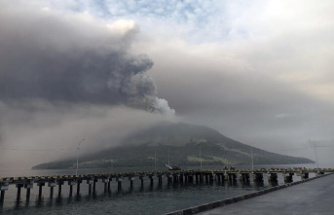The White House announced that President Joe Biden and Russian President Vladimir Putin would talk by phone about the crisis on Saturday as diplomatic options to avert war in Ukraine seemed limited.
Biden stated that the U.S. will not enter into a war with Ukraine, but he promised severe economic sanctions to Moscow, along with other international allies.
The timing of any possible Russian military action is a crucial question.
According to an American official, the U.S. has received intelligence suggesting that Russia may be considering Wednesday as a target date. The unnamed official was not allowed to speak out publicly and spoke only under condition of anonymity. The White House also stated that it does not know with certainty if Putin is planning to invade.
Officials from the United States stated that Russia's offensive air, land, and sea firepower has increased to the point that it could invade Ukraine in a matter of hours. Jake Sullivan, the national security advisor to Biden, urged Americans to evacuate Ukraine within 48 hours. He stressed that the U.S. military should not be expected to rescue them in case of an invasion by Russia.
Many NATO allies, including Canada, Norway, Denmark, and Britain, are also asking their citizens to leave Ukraine.
Sullivan stated that Russian military action could begin with missile and air strikes, then be followed by a ground offensive.
He stated that "Yes, it's an urgent message" because the White House was in an emergency situation.
Sullivan stated that Russia has all the necessary forces to carry out a major military operation. He also said that Russia could decide to launch a major military attack against Ukraine in a very short time.
Russia laughed at U.S. claims of urgency.
Maria Zakharova, Russian Foreign Ministry spokesperson, said that "the hysteria at the White House is more signifiable than ever." "The Anglo-Saxons require a war. Any cost. They love to use threats, misinformation, and provocations to solve their own problems.
The Russians also deployed special operations forces, missile, air and naval forces along the Ukraine's southern and eastern borders. Russia has moved six amphibious assault vessels into the Black Sea this week, increasing its ability to land marines along the coast.
Sullivan's warning was a stark reminder that a possible invasion is likely before the Winter Olympics in China, which are on February 20. Analysts have long believed it unlikely . Sullivan stated that the combination of a Russian troop buildup at Ukraine's borders, and unspecified intelligence indicators has prompted the administration warning that war could start anytime.
Sullivan stated that "we can't pinpoint a day at this time, and we cannot pinpoint an hour, but it is a very, very distinct possibility."
John Kirby, Pentagon press secretary, said that Lloyd Austin, Defense Secretary of NATO, had spoken by telephone with several NATO counterparts. Kirby repeated Sullivan's remarks and said that Austin had told them that a Russian invasion in Ukraine could occur at any moment.
Biden stated that U.S. troops would not enter Ukraine in order to resist any Russian invasion. However, he has increased the U.S. military presence within Europe to provide reassurance for allies on NATO’s eastern flank. The Pentagon announced Friday that Biden had ordered an additional 3,000 soldiers to Poland. This is in addition to the 1,700 already there. They form an infantry brigade for the 82nd Airborne Division. The U.S. Army is also moving 1,000 soldiers from Germany into Romania, which shares a border like Poland with Ukraine.
Gen. Mark Milley is the chairman of Joint Chiefs of Staff and spoke to his Russian counterpart, General Valery Gerasimov, by phone on Friday. Milley's office did not provide any details other than to say that the two men discussed "several Security-related Issues of Concern." Milley also spoke by phone with several NATO counterparts, including Canada and France.
Antony Blinken (Secretary of State), was on a trip to Australia and was the first U.S. official publicly to declare that an invasion could occur before the Olympics end.
Sullivan refused to discuss intelligence details that led to the U.S. assessment, and denied a report that American officials believed Putin had made the decision not to invade. He said that U.S. officials believed there was "a strong probability" of an invasion.
Sullivan stated that he believes Sullivan may give the final go-order. It could happen very soon, Sullivan said.
Biden spoke with a number European leaders to highlight the U.S intelligence concerns about the possible imminence of an invasion by Russia. Sullivan stated that the Western leaders are united in their response to a Russian invasion by imposing severe economic and trade sanctions.
British defense secretary Ben Wallace visited Moscow the day after Liz Truss, British Foreign Secretary, held frosty talks to Sergey Lavrov about Russian foreign minister. He urged him not to withdraw Russian troops from Ukraine. Lavrov described the meeting as "conversation between dumb and deaf".
Russia has opened large-scale war games in Belarus on Wednesday, which will continue through the weekend. However, it denies any plans to invade Ukraine.
Russia insists that NATO keep Ukraine and former Soviet states out. The Russians also want NATO to stop deploying weapons close to its borders and to withdraw alliance forces from Eastern Europe. These demands are flatly rejected.
Sergei Shoigu, Russian Defense Minister, stated that the military-political environment in Europe was becoming more tense at the beginning of his talks with Wallace. This is not Russia's fault.
Shoigu stated that weapons shipments to Ukraine by the U.S. and Britain, along with other allies, have contributed to tensions. He also pointed out the recent deployment in Ukraine of British soldiers, asking why they were sent there and how long they would stay.
After the talks, Wallace spoke to reporters and said that the anti-tank missiles Britain sent to Ukraine were defensive tactical arms that are not a threat to any other country unless that country invades.
He called the talks "constructive" and frank and noted that his Russian counterpart assured him that Moscow does not intend to attack Ukraine. He also stressed that Russian troops residing near Ukrainian territory are clearly not "normal exercising".
Russia's troop concentration also includes troops deployed on the territory Belarus of its ally for large-scale joint drills that involve firing live ammunition. These exercises reached a crucial phase on Thursday and will continue through February 20. The Ukrainian capital is located approximately 75 km (47 miles) to the south of the Belarus border.
NATO Secretary General Jens Stoltenberg visited Romania's military base and praised the U.S. deployment as a "powerful demonstration of trans-Atlantic unity."
Since 2014, Ukraine's Kremlin-friendly leader was forced from power by a popular uprising. Russia and Ukraine are locked in bitter conflict. Moscow responded by annexed Crimea and supporting a separatist insurgency within eastern Ukraine. The fighting has claimed over 14,000 lives.
France and Germany brokered a 2015 peace agreement that helped to end large-scale fighting. However, regular skirmishes continue and attempts to reach a political solution have been stalled.












